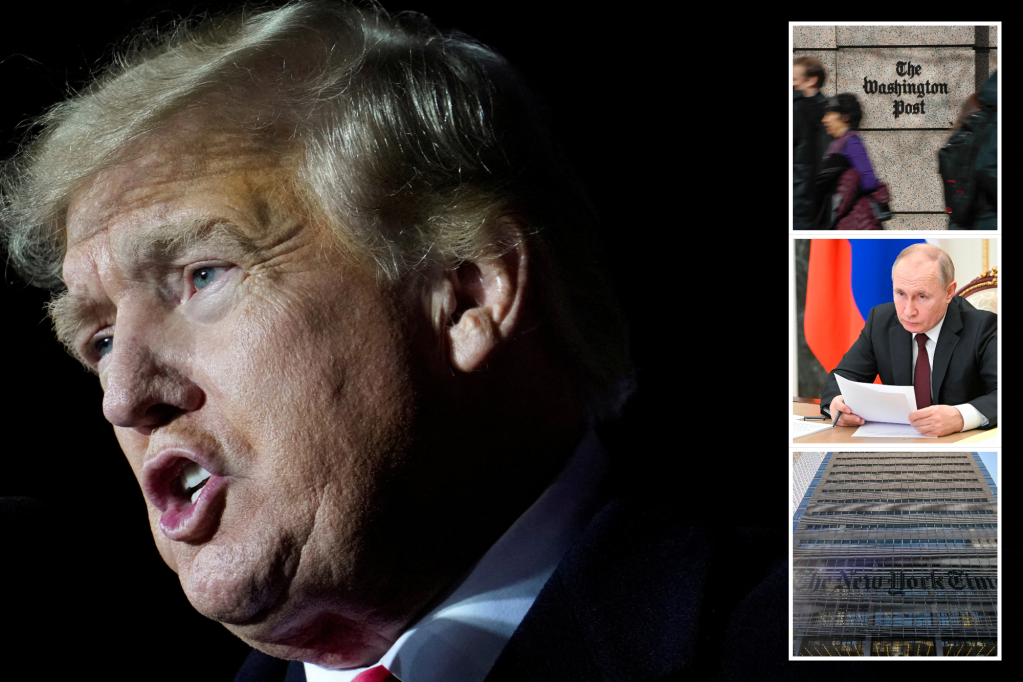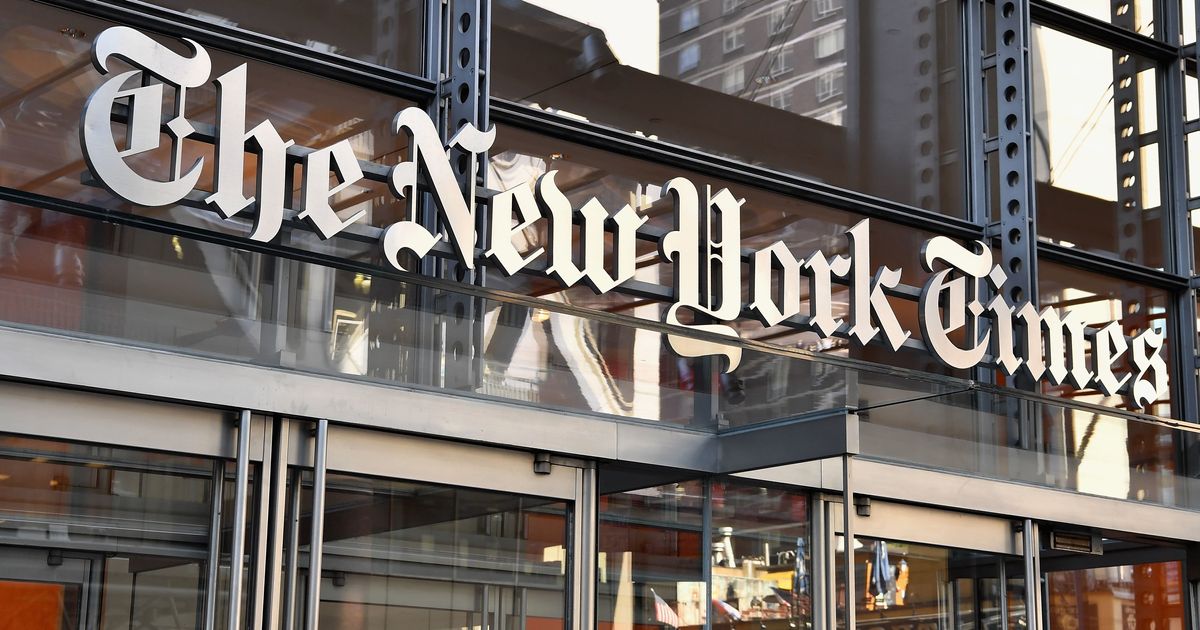This is coming from a very leftward group. All you libs need to come and get baptized here. Admit you were wrong for years. Admit you still want it to be right. This is sad.
TGP has more credibility than the NY Times and its not close.

 www.washingtontimes.com
www.washingtontimes.com

In this file photo, U.S. President Donald Trump (right) greets Russian Foreign Minister Sergey Lavrov (left) prior to his talks with Russian President Vladimir Putin (center) during the G-20 summit in Hamburg, Germany, on July 7, 2017. (Mikhail Klimentyev, Kremlin ... more >
By Dave Boyer - The Washington Times - Tuesday, January 31, 2023
An 18-month investigation by the liberal media watchdog Columbia Journalism Review has delivered a major black eye to The New York Times and other Pulitzer Prize winners for their stories about the Trump-Russia saga, finding “serious flaws” in their coverage and no acknowledgment that the accusations of collusion with Moscow were never substantiated.
Journalist Jeff Gerth, a former New York Times reporter, said his investigation found that news organizations didn’t follow their own rules for using anonymous sources and refused to be transparent about their work in attempting to prove links between the Trump campaign in 2016 and Russia.
CJR Editor-in-Chief Kyle Pope said of the episode, “No narrative did more to shape Trump’s relations with the press than Russiagate. The story, which included the Steele dossier and the Mueller report among other totemic moments, resulted in Pulitzer Prizes and embarrassing retractions and damaged careers.”
The Times and The Washington Post shared the 2018 Pulitzer Prize for national reporting on the Trump-Russia saga. The Pulitzer board praised the winners “for deeply sourced, relentlessly reported coverage in the public interest that dramatically furthered the nation’s understanding of Russian interference in the 2016 presidential election and its connections to the Trump campaign, the president-elect’s transition team and his eventual administration.”
Donald Trump called the accusations “fake news” from the beginning and has since demanded that the Pulitzer board rescind its awards.
The four-part CJR investigation bolsters Mr. Trump’s arguments as he gears up his 2024 presidential campaign. The lengthy review showed that news media, including The New York Times, tended to ignore facts that ran “counter to the prevailing narrative.”
“In January 2018, for example, The New York Times ignored a publicly available document showing that the FBI’s lead investigator didn’t think, after ten months of inquiry into possible Trump-Russia ties, that there was much there,” Mr. Gerth reported. “This omission disserved Times readers. The paper says its reporting was thorough and ‘in line with our editorial standards.’”
The report also recounts how The New York Times newsroom was shocked and caught “flat-footed” when special counsel Robert Mueller told Congress that he wouldn’t pursue Mr. Trump’s ouster. New York Times Executive Editor Dean Baquet’s reaction to his staff was, “Holy s—t. Bob Mueller is not going to do it.”
Despite the unexpected outcome, Mr. Gerth wrote, “Neither Baquet nor his successor, nor any of the paper’s reporters, would offer anything like a postmortem of the paper’s Trump-Russia saga, unlike the examination The Times did of its coverage before the Iraq War.”
The New York Times did not respond to a request for comment from The Washington Times. In a statement to CJR, The New York Times said it stood by its reporting and pointed to the prizes it had won. It said The Times substantiated findings with various other investigations. The paper said it “thoroughly pursued credible claims, fact-checked, edited, and ultimately produced ground-breaking journalism that has proven true time and again.”
CJR’s report also was critical of the media’s “turbocharged” use of intentionally vague descriptors of anonymous sources such as “government official” or “American official,” which he said were often used “to mask congressional leakers.”
“A few reporters admitted that to me, but, of course, only anonymously,” Mr. Gerth reported. “Here’s how it works. First, a federal agency like the CIA or FBI secretly briefs Congress. Then Democrats or Republicans selectively leak snippets. Finally, the story comes out, using vague attribution.”
Former FBI spokesman Mike Kortan told Mr. Gerth, “It was a problem for us. We would brief Congress, try and give them a full picture with the negative stuff, and then a member of Congress can cherry-pick the information and the reporter doesn’t know they’ve been cherry-picked.”
“The typical reader or viewer is clueless,” the CJR report concluded.
It said The New York Times used the catchall descriptor “person familiar with” more than 1,000 times in its coverage of the Trump-Russia saga.
House Speaker Kevin McCarthy, California Republican, refuses to keep Adam Schiff, California Democrat, on the House Permanent Select Committee on Intelligence, which he once chaired. He accuses Mr. Schiff of misleading the use of intelligence during the Trump administration. Mr. Schiff has denied any improper actions.
CJR interviewed Mr. Trump twice for the report and said he “remains furious over what he calls the ‘witch hunt’ or ‘hoax’ and remains obsessed with Mueller.”
“I realized early on I had two jobs,” Mr. Trump said. “The first was to run the country, and the second was survival. I had to survive: the stories were unbelievably fake.”
In January 2017, just days before Mr. Trump’s inauguration, The New York Times published a story with the headline “Intercepted Russian Communications Part of Inquiry Into Trump Associates.” Mr. Gerth wrote that the report “evoked a strong reaction from [Peter] Strzok, who was leading the FBI inquiry: ‘no substance and largely wrong,’ he texted, adding that ‘the press is going to undermine its credibility.’”
The paper pumped up its coverage a month later with a report headlined “Trump Campaign Aides Had Repeated Contacts With Russian Intelligence.” Mr. Gerth wrote that Mr. Baquet signed off and called it the “biggest story in years.”
“The piece did contain a disclaimer up high, noting that their sources, ‘so far,’ had seen ‘no evidence’ of the Trump campaign colluding with the Russians,” Mr. Gerth wrote. “But in the next paragraph it reported anonymous officials being ‘alarmed’ about the supposed Russian-Trump contacts because they occurred while Trump made his comments in Florida in July 2016 wondering whether Russia could find Hillary’s missing emails.”
The CJR report details how liberal media lined up against Mr. Trump from the start of his campaign announcement in 2015 and how journalists worked with Hillary Clinton’s campaign and government officials to promote the bogus Trump-Russia narrative. He said liberals’ concerns about Mr. Trump “would be supercharged by a small group of journalists turned private investigators who operated out of a small office near Dupont Circle in Washington under the name Fusion GPS.”
“In late May 2016, Glenn Simpson, a former Wall Street Journal reporter and a Fusion cofounder, flew to London to meet [Christopher] Steele, a former official within MI6, the British spy agency,” Mr. Gerth wrote. “By then, Fusion had assembled records on Trump’s business dealings and associates, some with Russia ties, from a previous, now terminated engagement. … Weeks before the trip to London, Fusion signed a new research contract with the law firm representing the Democratic National Committee and the Clinton campaign.”
The now-familiar maneuvers included Democratic lawyer Michael Sussmann’s secret briefing to FBI General Counsel James Baker about back-channel accusations from the Clinton campaign on supposed Trump connections to a Russian bank. The accusations would soon be the subject of a bombshell media report. Mr. Sussmann later gave the story to a New York Times reporter. He was acquitted last year of a charge that he lied to Mr. Baker about whom he was representing when he delivered the Alfa Bank accusations.
Journalist Matt Taibbi, who recently worked with Twitter owner Elon Musk to expose the platform’s liberal bias in the Trump era, told Mr. Gerth that the journalism establishment shunned reporters who didn’t buy into the Trump-Russia narrative. He said the “more neutral approach” to reporting “went completely out the window once Trump got elected.”
“Saying anything publicly about the story that did not align with the narrative — the repercussions were huge for any of us that did not go there. That is crazy,” Mr. Taibbi told CJR.
Independent journalist Glenn Greenwald said the media “did no self-examination” despite being shocked that the Mueller investigation didn’t turn up evidence of Trump-Russia collusion.
“It’s one of the best comprehensive accounts yet of the pervasive lying and deep corruption that drove the media’s Russiagate hoax,” Mr. Greenwald said on Twitter of the CJR report. “So amazing how many of these media outlets refuse to comment. Transparency for everyone except them.”
Mr. Gerth said he was frustrated by the lack of transparency from journalists whose work he was reviewing.
“I reached out to more than sixty journalists; only about half responded,” he wrote. “Of those who did, more than a dozen agreed to be interviewed on the record. However, not a single major news organization made available a newsroom leader to talk about their coverage.”
The CJR report said U.S. media now have “the lowest credibility — 26 percent — among forty-six nations, according to a 2022 study by the Reuters Institute for the Study of Journalism.”
“In 2021, 83% of Americans saw ‘fake news’ as a ‘problem, and 56% — mostly Republicans and independents — agreed that the media were ‘truly the enemy of the American people,’ according to Rasmussen Reports,” CJR said.
• Dave Boyer can be reached at dboyer@washingtontimes.com.
TGP has more credibility than the NY Times and its not close.

Journalism watchdog chastises Pulitzer winners for Trump-Russia tales
An 18-month investigation by the liberal media watchdog Columbia Journalism Review has delivered a major black eye to The New York Times and other Pulitzer Prize winners for their stories about the Trump-Russia saga, finding “serious flaws” in their coverage and no acknowledgment that the...

In this file photo, U.S. President Donald Trump (right) greets Russian Foreign Minister Sergey Lavrov (left) prior to his talks with Russian President Vladimir Putin (center) during the G-20 summit in Hamburg, Germany, on July 7, 2017. (Mikhail Klimentyev, Kremlin ... more >
By Dave Boyer - The Washington Times - Tuesday, January 31, 2023
An 18-month investigation by the liberal media watchdog Columbia Journalism Review has delivered a major black eye to The New York Times and other Pulitzer Prize winners for their stories about the Trump-Russia saga, finding “serious flaws” in their coverage and no acknowledgment that the accusations of collusion with Moscow were never substantiated.
Journalist Jeff Gerth, a former New York Times reporter, said his investigation found that news organizations didn’t follow their own rules for using anonymous sources and refused to be transparent about their work in attempting to prove links between the Trump campaign in 2016 and Russia.
CJR Editor-in-Chief Kyle Pope said of the episode, “No narrative did more to shape Trump’s relations with the press than Russiagate. The story, which included the Steele dossier and the Mueller report among other totemic moments, resulted in Pulitzer Prizes and embarrassing retractions and damaged careers.”
The Times and The Washington Post shared the 2018 Pulitzer Prize for national reporting on the Trump-Russia saga. The Pulitzer board praised the winners “for deeply sourced, relentlessly reported coverage in the public interest that dramatically furthered the nation’s understanding of Russian interference in the 2016 presidential election and its connections to the Trump campaign, the president-elect’s transition team and his eventual administration.”
Donald Trump called the accusations “fake news” from the beginning and has since demanded that the Pulitzer board rescind its awards.
The four-part CJR investigation bolsters Mr. Trump’s arguments as he gears up his 2024 presidential campaign. The lengthy review showed that news media, including The New York Times, tended to ignore facts that ran “counter to the prevailing narrative.”
“In January 2018, for example, The New York Times ignored a publicly available document showing that the FBI’s lead investigator didn’t think, after ten months of inquiry into possible Trump-Russia ties, that there was much there,” Mr. Gerth reported. “This omission disserved Times readers. The paper says its reporting was thorough and ‘in line with our editorial standards.’”
The report also recounts how The New York Times newsroom was shocked and caught “flat-footed” when special counsel Robert Mueller told Congress that he wouldn’t pursue Mr. Trump’s ouster. New York Times Executive Editor Dean Baquet’s reaction to his staff was, “Holy s—t. Bob Mueller is not going to do it.”
Despite the unexpected outcome, Mr. Gerth wrote, “Neither Baquet nor his successor, nor any of the paper’s reporters, would offer anything like a postmortem of the paper’s Trump-Russia saga, unlike the examination The Times did of its coverage before the Iraq War.”
The New York Times did not respond to a request for comment from The Washington Times. In a statement to CJR, The New York Times said it stood by its reporting and pointed to the prizes it had won. It said The Times substantiated findings with various other investigations. The paper said it “thoroughly pursued credible claims, fact-checked, edited, and ultimately produced ground-breaking journalism that has proven true time and again.”
CJR’s report also was critical of the media’s “turbocharged” use of intentionally vague descriptors of anonymous sources such as “government official” or “American official,” which he said were often used “to mask congressional leakers.”
“A few reporters admitted that to me, but, of course, only anonymously,” Mr. Gerth reported. “Here’s how it works. First, a federal agency like the CIA or FBI secretly briefs Congress. Then Democrats or Republicans selectively leak snippets. Finally, the story comes out, using vague attribution.”
Former FBI spokesman Mike Kortan told Mr. Gerth, “It was a problem for us. We would brief Congress, try and give them a full picture with the negative stuff, and then a member of Congress can cherry-pick the information and the reporter doesn’t know they’ve been cherry-picked.”
“The typical reader or viewer is clueless,” the CJR report concluded.
It said The New York Times used the catchall descriptor “person familiar with” more than 1,000 times in its coverage of the Trump-Russia saga.
House Speaker Kevin McCarthy, California Republican, refuses to keep Adam Schiff, California Democrat, on the House Permanent Select Committee on Intelligence, which he once chaired. He accuses Mr. Schiff of misleading the use of intelligence during the Trump administration. Mr. Schiff has denied any improper actions.
CJR interviewed Mr. Trump twice for the report and said he “remains furious over what he calls the ‘witch hunt’ or ‘hoax’ and remains obsessed with Mueller.”
“I realized early on I had two jobs,” Mr. Trump said. “The first was to run the country, and the second was survival. I had to survive: the stories were unbelievably fake.”
In January 2017, just days before Mr. Trump’s inauguration, The New York Times published a story with the headline “Intercepted Russian Communications Part of Inquiry Into Trump Associates.” Mr. Gerth wrote that the report “evoked a strong reaction from [Peter] Strzok, who was leading the FBI inquiry: ‘no substance and largely wrong,’ he texted, adding that ‘the press is going to undermine its credibility.’”
The paper pumped up its coverage a month later with a report headlined “Trump Campaign Aides Had Repeated Contacts With Russian Intelligence.” Mr. Gerth wrote that Mr. Baquet signed off and called it the “biggest story in years.”
“The piece did contain a disclaimer up high, noting that their sources, ‘so far,’ had seen ‘no evidence’ of the Trump campaign colluding with the Russians,” Mr. Gerth wrote. “But in the next paragraph it reported anonymous officials being ‘alarmed’ about the supposed Russian-Trump contacts because they occurred while Trump made his comments in Florida in July 2016 wondering whether Russia could find Hillary’s missing emails.”
The CJR report details how liberal media lined up against Mr. Trump from the start of his campaign announcement in 2015 and how journalists worked with Hillary Clinton’s campaign and government officials to promote the bogus Trump-Russia narrative. He said liberals’ concerns about Mr. Trump “would be supercharged by a small group of journalists turned private investigators who operated out of a small office near Dupont Circle in Washington under the name Fusion GPS.”
“In late May 2016, Glenn Simpson, a former Wall Street Journal reporter and a Fusion cofounder, flew to London to meet [Christopher] Steele, a former official within MI6, the British spy agency,” Mr. Gerth wrote. “By then, Fusion had assembled records on Trump’s business dealings and associates, some with Russia ties, from a previous, now terminated engagement. … Weeks before the trip to London, Fusion signed a new research contract with the law firm representing the Democratic National Committee and the Clinton campaign.”
The now-familiar maneuvers included Democratic lawyer Michael Sussmann’s secret briefing to FBI General Counsel James Baker about back-channel accusations from the Clinton campaign on supposed Trump connections to a Russian bank. The accusations would soon be the subject of a bombshell media report. Mr. Sussmann later gave the story to a New York Times reporter. He was acquitted last year of a charge that he lied to Mr. Baker about whom he was representing when he delivered the Alfa Bank accusations.
Journalist Matt Taibbi, who recently worked with Twitter owner Elon Musk to expose the platform’s liberal bias in the Trump era, told Mr. Gerth that the journalism establishment shunned reporters who didn’t buy into the Trump-Russia narrative. He said the “more neutral approach” to reporting “went completely out the window once Trump got elected.”
“Saying anything publicly about the story that did not align with the narrative — the repercussions were huge for any of us that did not go there. That is crazy,” Mr. Taibbi told CJR.
Independent journalist Glenn Greenwald said the media “did no self-examination” despite being shocked that the Mueller investigation didn’t turn up evidence of Trump-Russia collusion.
“It’s one of the best comprehensive accounts yet of the pervasive lying and deep corruption that drove the media’s Russiagate hoax,” Mr. Greenwald said on Twitter of the CJR report. “So amazing how many of these media outlets refuse to comment. Transparency for everyone except them.”
Mr. Gerth said he was frustrated by the lack of transparency from journalists whose work he was reviewing.
“I reached out to more than sixty journalists; only about half responded,” he wrote. “Of those who did, more than a dozen agreed to be interviewed on the record. However, not a single major news organization made available a newsroom leader to talk about their coverage.”
The CJR report said U.S. media now have “the lowest credibility — 26 percent — among forty-six nations, according to a 2022 study by the Reuters Institute for the Study of Journalism.”
“In 2021, 83% of Americans saw ‘fake news’ as a ‘problem, and 56% — mostly Republicans and independents — agreed that the media were ‘truly the enemy of the American people,’ according to Rasmussen Reports,” CJR said.
• Dave Boyer can be reached at dboyer@washingtontimes.com.

